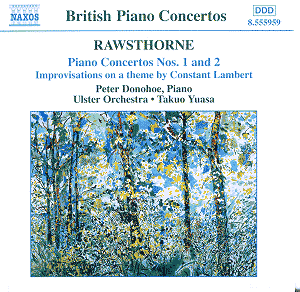Recently I stayed at the Sykeside hotel in Haslingden
in Lancashire. Apart from being an excellent place to spend a
weekend in April it had an additional attraction to me. It was
the boyhood home of Alan Rawsthorne. It is not his birthplace
I hasten to add; that was, I understand demolished. Whether or
not I slept in his bedroom is beside the point; it was quite a
moving experience to listen to these two piano concertos on my
personal stereo whilst looking out over the Lancashire countryside
to the hills high above Rawtenstall. Of course these works are
not new to me. I first came across one of them - the Second
with John Ogdon - in an old boxed set of British Piano Concertos
that made me spend a vast amount of my pocket money back in 1977.
Since then there has been the fine Chandos recording with Geoffrey
Tozer (CHAN 9125). To be fair, I had already listened to this
new Naxos disk in my London flat and had formed my opinion of
its superb playing by the time I arrived 'oop North.' However,
I shall never forget the opportunity to listen to these works
in Rawsthorne's boyhood home.
Lancashire has of course provided the world with
William Walton (from Oldham) and the light music composer and
conductor Ernest Tomlinson (from Rawtenstall). And let us not
forget John McCabe. Although born in Huyton he has been associated
with Manchester. He is not only a fine composer and performer
but also a scholar to boot. His biography of Rawsthorne is second
to none - a type of what such works should be.
Of course, Alan Rawsthorne is not the best known
of British composers. To most music lovers he is probably a closed
book; and this is unfortunate. True, many people will know some
of his film scores by default: The Cruel Sea and The
Captive Heart to name two examples. However his great symphonic
and chamber pieces are still waiting to be discovered by the 'classical'
public. I rarely hear him played on Classic FM or even Radio Three.
There is no doubt that the two concertos presented
on this Naxos disc were important additions to this genre - and
that not only in a British context.
The First Concerto was composed in 1939
and has nods in the direction of the politics of the Spanish Civil
War. It was originally scored for moderate forces of strings and
percussion, but was later rescored for full orchestra in 1942.
I am reminded of Prokofiev and Ravel in this
music … perhaps even a few hints of George Gershwin! One thing
to emphasise is the clarity of the writing - not a note too many.
Strangely, it concludes quietly, rather than with a great peroration.
It is a fine work in the neo-classical tradition, well-played
and, for the most part, sounding great as well. However, the balance
in some of the passages does seem a little strange.
The Second Concerto was one of many fine
works commissioned for the 1951 'Festival of Britain.' There is
no doubt that this is a more 'popular' concerto than the first.
It is full of 'big' tunes' and 'typical' piano figuration. That
is not a criticism. For me this is one of the best British Piano
concertos (not!) in the repertoire. I suppose even for 1951 it
was somewhat dated in its sound world, yet its overall effect
is one of enjoyment and prompts admiration for the skills of performer
and composer. Listen out for the 'calypso' in the last movement.
Naxos supplies us with the 1960 work, Improvisations
on a Theme by Constant Lambert. This work is much more
in sympathy with the prevailing musical vocabulary of the time
than the Second Concerto. Rawsthorne explores the seven notes
of the Lambert phrase using various musical devices, including
his own brand of serialism. Yet he brings his usual mix of romanticism
and neo-classicism to this work. I have long felt that this deserves
to be better known, even among Rawsthorne enthusiasts. It reminds
me, to that extent, of the later Walton work, Improvisations
on an Impromptu of Benjamin Britten
(1969). Both are masterpieces yet both are little played.
I suppose most Rawsthorne cognoscenti will compare
this recording with the Chandos one mentioned above. For me the
main reason for running with Tozer is the simple fact that we
get the rare Concerto for Two Pianos. This gives us all the composer's
concerted piano music. However, Donohoe's version has many delights
and competencies that make it essential.
Now I am biased - I am a long-time Rawsthorne
enthusiast. I have both versions of this work and would buy any
more that were to be issued. However, the present recording wins
on budget. And I imagine most British Music lovers will want the
Second Piano Concerto as a part of their collection.
A further detail or two about Haslingden. I invite
everyone to make the trip to this fascinating part of Lancashire.
It is a smashing little town that has done so much to improve
its appearance in these post-industrial days. The war memorial
is one of the most moving I know. And do not forget to visit the
Griffen pub to sample some of the Porter Brewing Company's fine
ales!
Haslingden
Community Website
John France
see also reviews by
Colin Clarke and Tony
Haywood
